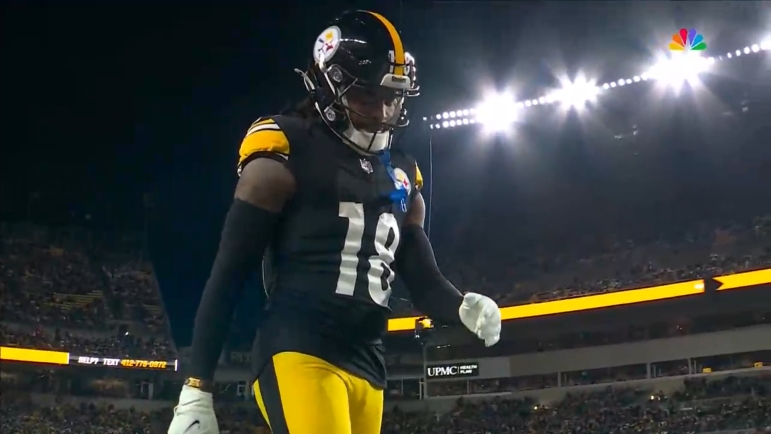For all of the Pittsburgh Steelers’ dramatic and headline-making offseason moves, ones that re-shaped the look and feel of their roster, they come away with an above-average offseason grade. Analytics guru Seth Walder set out to assign letter grades to each team for their offseason moves, giving Omar Khan a “B” for his efforts these past three months. As he did for every team, he noted the moves he liked the most and least. Walder praised the trade for QB Justin Fields while dinging the team for its Diontae Johnson deal.
“Fields offers an upside [Russell] Wilson no longer possesses,” Walder writes of the team’s quarterback moves. “While neither is likely to be the Steelers’ long-term answer, both are worth taking a shot on. In fact, if there’s a major quarterback injury in August, I don’t think it’ll be unfathomable for the Steelers to flip either player for a profit.”
Pittsburgh acquired Fields and Russell Wilson for pennies on the dollar. Taking advantage of their unique circumstances, the Chicago Bears made Fields expendable by holding the No. 1 overall pick they took USC QB Caleb Williams with. Had they not been in that position, it’s possible Fields would’ve remained a Bear for at least one more season. Denver was eager to dump Wilson after two unsatisfactory seasons. Still on the hook for his contract, Pittsburgh only needed to pay league minimum to sign him as its presumed starter.
Unlike Walder’s commentary, the Steelers are hoping one of them will become a long-term option. Or else it’s back to the drawing board in 2025. Wilson, Fields, and even third-stringer Kyle Allen are on expiring deals, making the future of the quarterback situation murky. Pittsburgh hopes to have a stronger sense of direction come January.
One move Walder didn’t like was the Diontae Johnson trade. Sent packing after a bumpy 2023 with the team, the Steelers sent him and a seventh-round pick to the Carolina Panthers for CB Donte Jackson and a sixth-round pick.
“Trading Johnson for Jackson was an error in my view,” Walder writes. “While Jackson helps fill the void at corner opposite Joey Porter Jr., Johnson has much higher upside considering the incredible open scores (via our receiver tracking metrics) he has posted in his career — three 90-plus scores in five seasons.”
Johnson has typically graded well in ESPN’s analytics, viewed as a top route runner who could get open at will. Worse, the team’s yet to fill his spot on the depth chart. Roman Wilson is off to a reportedly slow start while the team’s cobbled-together group of veterans aren’t likely to replace Johnson’s production. Pittsburgh’s offense figures to be run and tight end heavy, mitigating his absence, but a true No. 2 receiver would do the team plenty of good. Jackson is an average corner on an expiring deal and isn’t as good a player as Johnson.
Walder also didn’t love the team signing LB Patrick Queen, spending money at a “non-premium” position like off-ball linebacker. But that was subdued by a team-friendly contract, Queen getting a smaller deal than expected. He signed for three years, $41 million.








